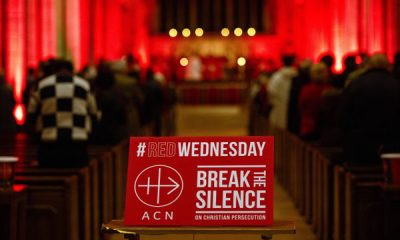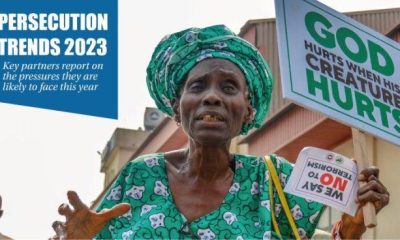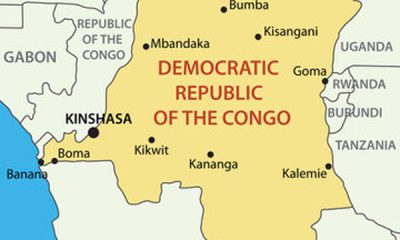world news
Why Christians Speak for the Persecuted
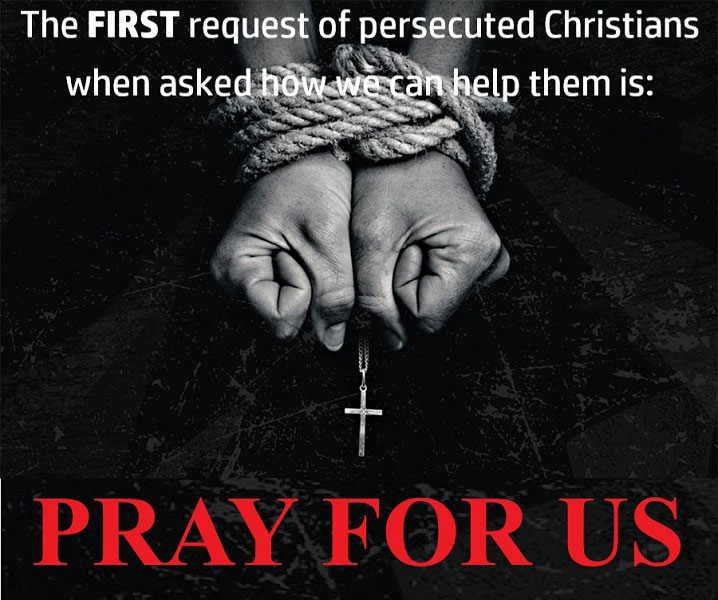
For some odd reason, a lumber supply store near my home likes to display the following quote on their lighted sign: “Well done is better than well said.” Perhaps the store imagines it’s in competition with the local library that is less than a mile away? More likely, the store owners are hoping to attract people who get things done by taking a shot at those who “just talk about” doing something. Doers frequent lumber stores more reliably than talkers. Doers get things done — with supplies from the lumber store.
The “doer” attitude resonates with many. Consider the various adages in our vernacular that disparage the value of speaking while extolling the virtue of action: “Actions speak louder than words,” “Talk is cheap,” “It’s a lot easier to talk about it than to do it,” or even “Put your money where your mouth is.” The doers have a well-stocked arsenal of adages.
What does the prevalence of such an armada of adages mean to those who think it’s important to speak up? This question points directly to those of us who speak on behalf of persecuted Christians, forcing the evaluation: What good is accomplished by speaking on behalf of persecuted Christians? Can anything get done by simply talking about injustices against Christians? Could greater results be achieved through action? In other words, wouldn’t “well done” be better than “well said”?
From the beginning, Christians put great confidence in speaking and preaching truth. Christians derive their conviction to speak from no one less than Christ Himself. Christ’s very identity is communicated to humankind by way of the Word. Christ is the Word of God incarnate (the Logos). In a sense, he arrived on the earth as God’s final speech to humanity. The writer of Hebrews says it this way: “In these last days God has spoken to us in His Son” (Hebrews 1). Christ is God’s word spoken to a world that desperately needs to listen.
Is God a God of the Word only? Of course not! Christ took on flesh. He grew in obedience. He suffered righteously (and unjustly). He offered himself as a sacrifice for others. He died. He rose again! He demanded obedience from all who wish to get out of this life alive. In short, he accomplished the Father’s will in word — and deed. God demands action as well as words.
To say it in a slightly different manner, God’s Justice demands action. This concept is not difficult to understand. Our own justice system demands action: Our legal system doesn’t simply say “guilty”; it also demands that actions follow in the form of sentencing that might include restitution or incarceration. So, in Christian faithfulness, words and actions both play a part. Which part is greater? How might Christians resolve the tension between talking and doing? Between speech and action?
Taking a cue from biblical accounts of creation, Christians believe that words can be actions. God said, “Let there be light,” and there was light. The words of God performed the action of creating the world (Genesis 1, John 1). Christians, therefore, place a high value on speech. Speech is action. Christian tradition is replete with powerful proclamations against injustice, as though speeches were worthy of great effort and could produce great effects. For Christians, sometimes “well said” is actually better than “well done.” The tension between speech and action reveals the profound power of the Christian faith.
Resolving the tension between speech and action does more than reveal the power of Christian speech. However, it also exposes the dreadful weakness of other worldviews. Many voices clamor to be heard. Some of these voices demand to be heard but will not (or cannot) listen, thus embracing manipulative tactics of power to stop the powerless from speaking. These tactics minimize both the value and need for words. Christians must not forsake words for oppressive actions. Instead, Christians speak truth and invite others into it. Christians speak out against those who shut down debate, deploy power, issue threats, and cause persecution.
Belief in the power of speech — or of words — is not an explicitly Christian value. However, the Christian framework is unique in that it ascribes the creation power of words to God alone. When God is removed from the conversation, people try to claim the creative power of words for themselves. Nearly eight decades ago, French playwright and philosopher Jean-Paul Sartre famously declared, “Words are loaded pistols.” Sartre’s declaration has morphed into an adage of its own, one that is popular in our cultural vocabulary. Yet, our usage of the phrase is not technically how Sartre himself used it. Like other existentialists of the mid-twentieth century, Sartre thought that individuals had the power to take aim at old ideas of the world and create constantly renewing reality through words.
When Sartre stated that words are loaded pistols, he was quoting another French thinker, Brice Parain. Sartre and Parain agreed on some points but actually disagreed on the fundamental nature of words. Sartre believed words had a utilitarian function when they were written as prose and employed for a purpose. According to Sartre, the prose writer deployed words creatively — in complete freedom — to boldly assert reality. Parain, on the other hand, was more reserved. He never wandered completely away from the traditional conviction that words possess meaning anchored somewhere transcendent in language beyond the limited human understanding.
In other words, Parain never surrendered words to their utilitarian function. He remained some distance from Sartre. For Sartre, words were signs to be utilized by the writer or speaker to enact or enforce a political ideal (he was, for a long time, a Communist). For Sartre, words force a reality crisis in the moment, cutting against (or deconstructing?) the past while compelling future change. Words are loaded in the sense — almost a God-like sense — of new creation of a revolutionary new reality.
Parain’s abiding sense of transcendence provides a better conception of words being loaded pistols. For Parain, words must have true and abiding meaning. Words are not merely calls to action. They convey meaning, and if they don’t convey meaning, then nothing in the world matters. Here is how another French writer describes Parain’s concept of words:
“Parain’s basic premise is that if language is meaningless, then everything is meaningless, and the world becomes absurd. We know only by means of words. If they are proved useless, then we are finally and irredeemably blinded” (Albert Camus, Lyrical and Critical Essays, 230).
For Christians, words are far from meaningless. Words are anchored in the divine Word. As John points out in the prologue to his gospel, “The word coming into the world enlightens everyone” (John 1:9). Human beings can communicate by words because God constructed the world by word. Further, God has designed the world and the human mind to communicate with and by His Word. God is not silent. He is speaking truth about the world, who his people are, what he demands, and what he condemns (Romans 1). As a result, no one has an excuse before God. His word is being heard — even if not obeyed.
Returning to the simple questions posed at the beginning of this article, what good are words? Is action better? Even more particularly, does it help to speak up for persecuted Christians? The answer follows the nature of God’s Word and our words. When we speak a word about injustices against God’s children, we are firing a loaded pistol, as it were, directly at the heart of unrighteousness. God’s righteousness demands that God’s people worship and serve him only. Persecution defies the righteousness of God as directly as Pharaoh defied Moses in Egypt — and ultimately leads to a similar destruction for the persecutors.
If we use words as Sartre proposed and make them mere expressions of ourselves forcing reality into existence, then we actually rob words of their power. We would be pretending to possess the God-like power to create reality through our speech acts. We would end up delusional rather than divine. We, in fact, would become less in tune with the real world and other human beings and more inclined toward a delusional life like Don Quixote, who famously jousts with windmills in a fantastic battle against non-existent giants. In other words, taking action based on our own words leads to fruitless, imaginary fighting for vainglorious conquests — having zero impact for justice or the well-being of other people.
To have a true and lasting influence on the real world, Christians must speak words against injustice and for the righteousness of God in Christ. Christians understand that everything that has come into being has done so through the power of God’s Word (John 1). Even now, everything in creation is being sustained by the same word of His power (Hebrews 1). So, what do our words accomplish? Quite a lot — if our words accord with the real world governed by the true word of God. When our words are spoken in accordance with God’s Word, then we are calling human beings to account before God and pleading with them to wake up to God.
Speaking against injustice is speaking for the right order of the real world as God created it. Such speaking puts the world on notice that the God who created all things and all people (Genesis) is the same God who is even now working all things together for his people and cataloging an account of those who oppose him, promising vengeance in the day of his wrathful return (Revelation). Between the past creation and the future recompense, God has fixed a day in which people might hear his voice and repent. Today is the day of God’s salvation! Today is the day in which our speaking words might lead to others finding regenerating faith.
What if speaking words is active participation with God? If this is the case (and it is), then our words will not return void. They will not be in vain. They will accomplish something in God’s work. Our words against persecutors and for the persecuted church speak of salvation for all who will hear and believe. Our words are a powerful blessing to the world, like those blue emergency signs on interstate highways that instruct drivers to “tune your radio to AM 510 for important emergency instructions.”
When speaking words this way, Christians demonstrate that “well said” is better than “well done.” Or, maybe “well said” is also “well done, good and faithful servants.”
Sources:persecution
world news
സൗദി റിയാലിന് പുതിയ ചിഹ്നം

റിയാദ് : സൗദി റിയാലിന് പുതിയ ചിഹ്നം പ്രഖ്യാപിച്ച് സൗദി അറേബ്യ. ദേശീയ കറൻസിയുടെ ഐഡന്റിറ്റി ശക്തിപ്പെടുത്തുന്നതിനുള്ള നടപടിയുടെ ഭാഗമായാണ് പുതിയ ചിഹ്നം അവതരിപ്പിച്ചത്. അറബിക് കാലിഗ്രാഫിയിൽ നിന്നും പ്രചോദനം ഉൾക്കൊണ്ടുള്ള ഒരു രൂപകൽപ്പനയാണ് ചിഹ്നത്തിൽ ഉപയോഗിച്ചിരിക്കുന്നത്.
പുതിയ ചിഹ്നം പുറത്തിറക്കിയ വേളയിൽ, സെൻട്രൽ ബാങ്ക് ഗവർണർ അയ്മാൻ അൽ സയാരി, രാജാവ് സൽമാൻ ബിൻ അബ്ദുൽ അസീസിനും കിരീടാവകാശിക്കും നന്ദി അറിയിച്ചു. റിയാൽ ചിഹ്നം പ്രാദേശിക, രാജ്യാന്തര തലങ്ങളിൽ രാജ്യത്തിന്റെ സാമ്പത്തിക ഐഡന്റിറ്റിക്ക് കരുത്തേകുമെന്നും അദ്ദേഹം പറഞ്ഞു. പുതിയ ചിഹ്നം ഉടൻ തന്നെ ഉപയോഗത്തിൽ വരുത്തുമെന്നും സാമ്പത്തിക, വാണിജ്യ ഇടപാടുകളിൽ ഇത് ക്രമേണ പ്രതിഫലിക്കുമെന്നും അദ്ദേഹം കൂട്ടിച്ചേർത്തു.
ദേശീയ സ്വത്വത്തിലും സാംസ്കാരിക ബന്ധത്തിലും അഭിമാനം വളർത്തുക, സൗദി റിയാലിന്റെ പദവി ഉയർത്തിക്കാട്ടുക, ആഗോള സമ്പദ്വ്യവസ്ഥയിൽ രാജ്യത്തിന്റെ സ്ഥാനം തെളിയിക്കുക എന്നിവയാണ് ചിഹ്നത്തിന്റെ ലക്ഷ്യങ്ങൾ.
Sources:globalindiannews
Saudi Arabia has introduced a new symbol for its local currency as part of efforts to establish the kingdom as a global financial hub.
The design, made up of Arabic calligraphy of the word riyal, will be implemented gradually for use in financial and commercial transactions, according to a statement from the country’s central bank.
The Saudi riyal has been pegged to the US Dollar since 1986 and is set at a fixed exchange rate of 3.75 riyals per $1. The peg has long helped the country facilitate international trade and investment, and serves the country’s broad Vision 2030 agenda to diversify the economy.
Under Crown Prince Mohammed bin Salman, the government has been spending hundreds of billions of dollars on everything from new cities to sports, tourism and technology. Saudi Arabia has also attracted hundreds of companies including Goldman Sachs Group Inc. and BlackRock Inc. to set up offices in Riyadh as it seeks to develop the capital into the Middle East’s premier business destination.
http://theendtimeradio.com
world news
കോംഗോയിലെ ദേവാലയത്തില് 70 ക്രൈസ്തവരെ ഇസ്ലാമിക് സ്റ്റേറ്റ്സ് തീവ്രവാദികള് കഴുത്തറത്ത് കൊലപ്പെടുത്തി
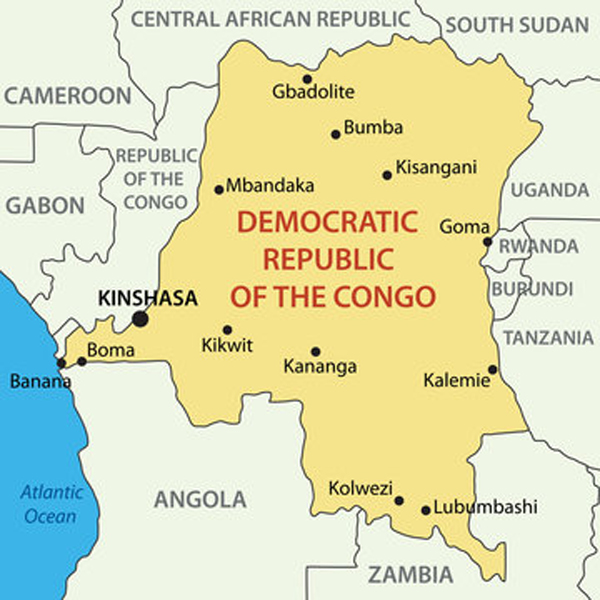
ബ്രാസാവില്ല: ആഫ്രിക്കന് രാജ്യമായ ഡെമോക്രാറ്റിക് റിപ്പബ്ലിക് ഓഫ് കോംഗോയിലെ ക്രൈസ്തവ ആരാധനാലയത്തില് എഴുപത് ക്രിസ്ത്യാനികളെ ശിരഛേദം ചെയ്ത നിലയിൽ കണ്ടെത്തി. രാജ്യത്തിൻ്റെ വടക്ക് കിഴക്കൻ ഭാഗത്ത് ക്രൈസ്തവ വിശ്വാസികൾക്ക് നേരെ നടന്ന ഏറ്റവും പുതിയ ആക്രമണമാണിതെന്ന് വിവിധ പ്രാദേശിക മാധ്യമങ്ങള് റിപ്പോര്ട്ട് ചെയ്യുന്നു. ഫെബ്രുവരി 13 വ്യാഴാഴ്ച പുലർച്ചെ 4 മണിയോടെ, ഇസ്ലാമിക് സ്റ്റേറ്റ്സുമായി ബന്ധമുള്ള സഖ്യകക്ഷികളായ ഡെമോക്രാറ്റിക് ഫോഴ്സിലെ (എഡിഎഫ്) തീവ്രവാദികളാണ് ആക്രമണം നടത്തിയത്.
എഡിഎഫ് തീവ്രവാദികൾ ഗ്രാമം വളഞ്ഞു 50 ക്രൈസ്തവ വിശ്വാസികളെ കൂടി പിടികൂടി. പിന്നീട് ഇരുപതു പേരെ കൂടി ബന്ദികളാക്കി 70 പേരെയും കസങ്കയിലെ പ്രൊട്ടസ്റ്റൻ്റ് ആരാധനാലയത്തില് കൊണ്ടുപോയി ദാരുണമായി കഴുത്ത് അറത്ത് കൊലപ്പെടുത്തുകയായിരിന്നുവെന്ന് വിവിധ മാധ്യമങ്ങള് റിപ്പോര്ട്ട് ചെയ്യുന്നു. ക്രൈസ്തവ നരഹത്യ അരങ്ങേറി ദിവസങ്ങള്ക്ക് ശേഷമാണ് പുറംലോകം വാര്ത്ത അറിയുന്നത്. സുരക്ഷ സാഹചര്യം താറുമാറായ പശ്ചാത്തലം കണക്കിലെടുത്ത് സംഭവത്തിന് മുന്പ്, പള്ളികളും സ്കൂളുകളും ആരോഗ്യ കേന്ദ്രങ്ങളും അടച്ചിരുന്നുവെന്ന് കോംബോ പ്രൈമറി സ്കൂൾ ഡയറക്ടർ മുഹിന്ദോ മുസുൻസി വെളിപ്പെടുത്തി.
രാജ്യത്തിൻ്റെ വടക്ക് കിഴക്കൻ മേഖലയിൽ എഡിഎഫ് തീവ്രവാദികൾ ഉയർത്തുന്ന ഭീഷണിയുടെ തുടർച്ചയാണ് ഏറ്റവും പുതിയ ഈ ദാരുണ സംഭവം. 2014-ൽ, നോർത്ത് കിവു പ്രവിശ്യയിലെ ബെനി പ്രദേശത്ത് സംഘം ആക്രമണം ശക്തമാക്കിയിരിന്നു. അതിനുശേഷം ആക്രമണങ്ങൾ ഇറ്റുരി പ്രവിശ്യയിലെ ഇരുമു, മംബസ പ്രദേശങ്ങളിലേക്ക് വ്യാപിച്ചു. കഴിഞ്ഞ മാസത്തിൽ മാത്രം, ബസ്വാഘ മേഖലയില് ഇരുനൂറിലധികം പേരെ സംഘം കൊന്നു. കഴിഞ്ഞ വർഷം, കോംഗോയില് 355 ക്രൈസ്തവരാണ് വിശ്വാസത്തിൻ്റെ പേരിൽ കൊല്ലപ്പെട്ടത്. മുൻ വർഷം 261 ആയിരുന്നു.
അതേസമയം 10,000 സാധാരണക്കാര് ആഭ്യന്തരമായി കുടിയൊഴിപ്പിക്കപ്പെട്ടു. ക്രൈസ്തവര് തിങ്ങി പാര്ത്തിരിന്ന നിരവധി ക്രിസ്ത്യൻ ഗ്രാമങ്ങൾ പൂർണ്ണമായും ഉപേക്ഷിക്കപ്പെട്ടു. റുവാണ്ടയുടെ പിന്തുണയുള്ള M23 വിമത ഗ്രൂപ്പാണ് സമീപകാല ആക്രമണങ്ങളില് ക്രൈസ്തവര്ക്ക് വലിയ ഭീഷണി ഉയര്ത്തിക്കൊണ്ടിരിക്കുന്നത്. കഴിഞ്ഞ വര്ഷം കോംഗോയില് ഇസ്ലാം മതം സ്വീകരിക്കാൻ വിസമ്മതിച്ചതിനെ തുടർന്ന് ഇസ്ലാമിക് സ്റ്റേറ്റ്സുമായി ബന്ധമുള്ള അക്രമികള് കത്തോലിക്ക വിശ്വാസികളെ കൊലപ്പെടുത്തിയ സംഭവത്തെ അപലപിച്ച് ഫ്രാന്സിസ് പാപ്പ രംഗത്ത് വന്നിരിന്നു.
കടപ്പാട് :പ്രവാചക ശബ്ദം
Christians in DRC have again been left reeling after a heinous act of violence that has left 70 believers dead. Please pray for our brothers and sisters in the country as they face escalating persecution.
Seventy Christians have been found beheaded in a church in the Democratic Republic of Congo (DRC), in what’s the latest devastating attack on believers in the north east of the country.
According to field sources, at around 4am last Thursday (13 February) suspected militants from the Allied Democratic Forces (ADF) – a group with ties to so-called Islamic State (IS) – approached homes in Mayba in the territory of Lubero, saying: “Get out, get out and don’t make any noise.” Twenty Christian men and women came out and were captured.
Shaken by this incident, people from the local community in Mayba later gathered to work out how to release those held captive. However, ADF militants surrounded the village and captured a further 50 believers.
All 70 of those kidnapped were taken to a Protestant church in Kasanga where they were tragically killed.
Muhindo Musunzi, director of the Kombo primary school [which belongs to the CECA20 church], says that prior to this incident, churches, schools and health centres had all shut their doors because of the chaotic security situation. “We had to move all activities towards Vunying,” he said.
Field sources report that, until Tuesday 18 February, some families had not been able to bury their dead because of insecurity in the area. Many Christians have now fled the area for their safety.
“We don’t know what to do or how to pray; we’ve had enough of massacres,” says an elder of the CECA20 church. “May God’s will alone be done.”
Rise in violence and internal displacement
This latest awful incident is a continuation of the escalating threat posed by ADF militants in the country’s north east region. In 2014, the group intensified attacks in Beni territory in North Kivu province, and since then attacks have spread to the territories of Irumu and Mambasa in Ituri province, and now it’s affecting Lubero. In the last month alone, the group have killed more than 200 people in Baswagha chiefdom, according to a local news website.
This explains why DRC rose six places to number 35 in the latest World Watch List. Last year, 355 were killed for their faith, compared with 261 the previous year, whilst an estimated 10,000 were internally displaced, which is ten times more than 2023. Houses have been looted and burnt, schools relocated, churches and health facilities closed, and several Christian villages have been abandoned altogether. The recent activities of the M23 rebel group, reportedly supported by Rwanda, has added to the vulnerability of Christians.
A call to remain in prayer
“Open Doors strongly condemns this heinous act of violence against civilians and calls upon civil societies, governments and international organisations to prioritise civilian protection in eastern DRC where armed groups, such as the ADF, are operating,” says John Samuel*, Open Doors’ legal expert for the work in sub-Saharan Africa.
“The violence takes place in a context of impunity, where almost no one is held accountable,” he continues. “This massacre is a clear indicator of widespread human rights violations against civilians and vulnerable communities, often targeting Christians, perpetrated by ADF – called Islamic State affiliate.”
“We further call on the international Christian community to remain in prayer for Christians and vulnerable communities in eastern DRC,” adds John Samuel. “Pray for an end to violence and that government at all levels will diligently, impartially, and transparently address the violence and its effects. Pray for the church in Lumbero as she seeks to bring physical and spiritual assistance to the families affected.
world news
കൊതുകിനെ പിടിക്കുന്നവര്ക്ക് പാരിതോഷികം പ്രഖ്യാപിച്ച് ഫിലിപ്പിന്സിലെ നഗരം.

കൊതുകുകളെ ജീവനോടെയോ കൊന്നോ എത്തിക്കുന്നവര്ക്ക് പാരിതോഷികം പ്രഖ്യാപിച്ച് ഫിലിപ്പിന്സിലെ മനിലയിലെ പ്രാദേശിക ഭരണകൂടം. ഡങ്കിപ്പനി നഗരത്തില് വ്യാപകമാകുന്ന പശ്ചാത്തലത്തിലാണ് പ്രഖ്യാപനം. കൊണ്ടുവരുന്ന അഞ്ച് കൊതുകിന് ഒരു പെസോ വീതമാണ് പാരിതോഷികമായി നല്കുക. ഇത്തരമൊരു അപൂര്വ പ്രഖ്യാപനം കൊതുകുപരത്തുന്ന പകര്ച്ചവ്യാധികളെ തടയേണ്ടതിന്റെ പ്രാധാന്യം ജനങ്ങളെ ഓര്മിപ്പിക്കുമെന്നും കൊതുകു നശീകരണ പ്രവര്ത്തനങ്ങള് ഊര്ജിതമാക്കുമെന്നും വില്ലേഡ് ക്യാപ്റ്റന് കാര്ലിറ്റോ കെര്നല് പറഞ്ഞു.
Sources:usmalayali
Authorities in one of the Philippines’ most densely-populated urban centres are offering a cash reward for mosquitoes in an attempt to stop the spread of dengue.
Carlito Cernal, village chief of Barangay Addition Hills in central Manila, announced the bounty of one peso (less than two US cents) for every five mosquitoes.
While news of the bounty has provoked scorn on social media, Mr Cernal has defended it as necessary for the community’s health.
The move follows a recent spike in cases of dengue, which is spread by mosquitoes, in the Philippines.
The programme, which will run for at least a month, was started after two students in Mr Cernal’s neighbourhood died from the disease.
The bounty applies to all mosquitoes – dead or alive – and their larvae, Mr Cernal added. Live mosquitoes will be exterminated using ultraviolet light.
A total of 21 people have already claimed their reward, bringing in a total of 700 mosquitoes and larvae so far, he told the BBC.
The bounty drew swift ridicule after it was announced late on Tuesday.
“Mosquito farming is coming,” one social media comment read. “Will a mosquito get rejected if it has only one wing?” read another.
The Philippines’ Department of Health (DOH) told the BBC that it “appreciates the good intentions of local government executives to fight dengue”.
It declined further comment, however, when asked if catching mosquitoes in exchange for cash is an effective way of stopping dengue.
“We urge all concerned to please consult and coordinate with their local health officers or the DOH regional office in their area for evidence-based practices that are known to work,” it said.
Mr Cernal said he was aware that the bounty had been bashed on social media, but added: “This is one of the biggest and most dense areas. We have to do something to help the local government.”
He pointed out that local health authorities recorded 44 cases of dengue in the community during the most recent surge of infections.
Barangay Addition Hills is home to nearly 70,000 people, crammed into a 162-hectare patch at the heart of the capital, Metro Manila.
Mr Cernal said the bounty was meant to supplement existing measures such as cleaning the streets and preventing the build-up of water where dengue-carrying mosquitoes lay their eggs.
-

 Travel9 months ago
Travel9 months agoയാക്കൂസ കരിഷ്മ:ഓല സ്കൂട്ടറിനേക്കാൾ വിലക്കുറവിൽ കുഞ്ഞൻ കാർ; സിറ്റി യാത്രകൾക്ക് ഇനി ഇവൻ മതിയാവും
-

 Movie3 months ago
Movie3 months agoFor KING + COUNTRY Stars’ Big Plan to Bring Message of Jesus, ‘Redemption of Humanity’ to People Across America
-
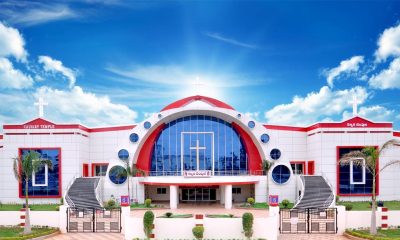
 National12 months ago
National12 months ago300,000-Member Indian Church to Plant 40 More Megachurches
-

 National12 months ago
National12 months agoനെയ്തേലിപ്പടി ക്രൂസേഡിന് അനുഗ്രഹീത സമാപ്തി
-

 Tech8 months ago
Tech8 months agoചിത്രങ്ങൾ എഡിറ്റ് ചെയ്യാം; വാട്സ്ആപ്പിലെ ‘നീല വളയം’ സ്മാർട്ടാകുന്നു, കാര്യമായ മാറ്റങ്ങൾ
-

 Movie3 months ago
Movie3 months agoFor KING + COUNTRY Stars’ Big Plan to Bring Message of Jesus, ‘Redemption of Humanity’ to People Across America
-

 Movie11 months ago
Movie11 months agoActor Ryan Phillippe ‘Craving’ Relationship With God After Movie About Christian Missionary
-

 Articles9 months ago
Articles9 months ago8 ways the Kingdom connects us back to the Garden of Eden



